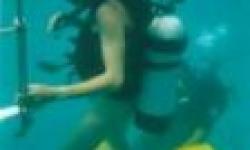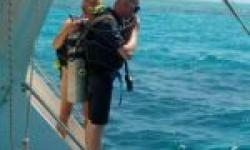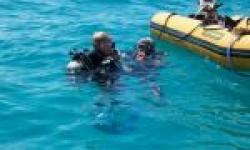Welcome to Cal Dive, Berkeley, United States. Cal Dive, Berkeley specializes in Private Diving Lessons to fit YOUR schedule! Available 8am-9pm anyday! Cal Dive offers: Rescue diver, Master Diver, Assistant Instructor, Divemaster, Instructor Trainer, ITC Staff member and Instructor courses are ongoing and will continue through the summer! Call or email Jim for current updates.
Our Scuba education courses include 4 pool sessions of 3 full hours each. Many Dive stores these days have gone to a "quickie" 2-daycourse. This is not good training. It is important you get comfortable with SCUBA gear and practice you're skills until you are as comfortable underwater as you are driving your car, or bicycle! The cost of your training includes lectures, pool skill training, the use of our SCUBA gear, a textbook, 4 ocean dives and certification card,
There are 3 basic parts to SCUBA education:
1. Academics. The physics of using compressed air, the knowledge concerning nitrogen absorption underwater, marine and environmental conditions, assembling and understanding of SCUBA apparatus, and pre-pool overviews: these are best taught in the lecture room.
2. Pool work: This is where you learn to SCUBA dive. Practicing with your mask, snorkel, fins, and scuba gear. Learning entries and exits from boats or shore, learning and practicing safe ascents and descents, practicing over and over mask clearing, ear pressure equalization and monitoring one's air supply. (Sounds important yes?)
3. Ocean dives: You cannot become a SCUBA diver just in a pool. You need to demonstrate your learned pool skills in the ocean with an Instructor doing 4 dives over 2 days. This is an industry standard and should not be compromised.
Additional costs: Snorkeling equipment: mask, snorkel, boots, fins and possibly gloves. SCUBA divers own their own mask, fins and snorkels. It is much more important than surface snorkeling. You cannot have gear problems 80 feet down. Costco quality mask/fin/snorkel kits won't do the job.
The first night of class is an orientation lecture including info on snorkeling gear; orientation to SCUBA gear, and all pertinent physics for your first pool session. By the time you finish your first pool, your Instructor will give you an honest appraisal whether you are going to be a SCUBA diver.
What it is like to learn to Dive. Most people who walk in our store are a little intimidated by the gear involved and the creatures in the ocean. Or even a little shy about the ocean. Well, don't be! The gear is less complex than your car, by a lot, and the only dangerous animal in the sea is mankind. Sharks won't eat your head, and you won't run out of air and drown because like in an airplane, there are important gauges (air, depth, etc.) to keep track of.
The first class is an orientation class to give you an outline of what's to come including your ocean Diving. We will teach you a few VERY important rules of physics that are easy to understand but you must be constantly aware of. If you drive a car at 60 mph on a 2-lane road and swerve into the traffic on your left, well, you're toast. We all understand this and drive without fear paying attention to which way the car is going. New laws of physics in Diving must be understood and in the same way.
You're first pool session is fun! A swim test is a reality check to see if you should participate in water sports. We use wet suits in our warm outdoor pool because even though the water can be 85 degrees, we talk a bunch and stand around in the shallow (4.5 ft.) end of the pool a lot.
The hardest skill to master is mask clearing - purposely flooding your mask underwater and clearing the water out by exhaling through your nose.
The next few pools are mostly about safety procedures. You will have been taught all possible trouble scenarios, two or three times. By the 4th pool you most likely will be sick of seeing the drain, the fake plastic fish, etc., and will be craving to see something alive in a bigger environment. Your first ocean dive will be like your first pool - a little intimidating.. A lot more water and getting in and out of the water and it's deeper and a bit darker so you will probably listen and stay close to your Instructors. But after 4 dives over 2 days again you will probably want to get away from these silly skills and go Diving.....
We (all Cal Diving SCUBA Instructors) want you to enjoy yourselves and NOT get hurt. If this all sounds tough or scary, you're wrong. It's easy and VERY safe. Television documentaries always play up the drama of big fish and big storms: why else would people watch. Think more like "Finding Nemo" without the 12 stepping sharks. Big fish stay far awayfrom humans! We Homo Sapiens are the dangerous ones.
If you like sports, seawater, fish, assorted sea animals, quiet and adventure like none other SCUBA is probably for you.



Cal Dive reviews
Login to comment